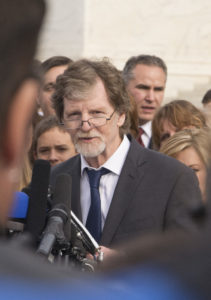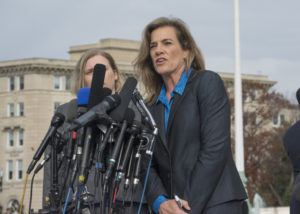WASHINGTON—The U.S. Supreme Court heard oral arguments Dec. 5 in the case of a Christian baker in Colorado who refused to design a wedding cake for a same-sex couple.
Masterpiece Cakeshop v. Colorado Civil Rights Commission deals with a commercial baker and cake decorator with a religious objection to same-sex marriage. Jack Phillips refused to create a decorated cake for the wedding reception of a same-sex couple, Charlie Craig and David Mullins. Phillips insisted he should be granted an exemption to Colorado’s Anti-Discrimination Act based on his sincerely held religious views about marriage.
Some court observers pointed to Justice Anthony Kennedy as the potential deciding vote on a closely divided court. During the oral argument, which lasted nearly an hour and a half, Kennedy voiced concerns a ruling on the baker’s behalf could allow businesses to display signs saying they deny services to same-sex couples. But he also said Colorado had been “neither tolerant nor respectful” of Phillips’ religious convictions.
Conflict with conscience
In a public statement issued following the oral arguments, Phillips insisted he serves “people from all walks of life,” but he could not in good conscience design a cake celebrating a view of marriage contrary to his religious beliefs.

“Though I serve everyone who comes into my shop, like many other creative professionals, I don’t create custom designs for events or messages that conflict with my conscience,” he said.
“I don’t create cakes that celebrate Halloween, promote sexual or anti-American themes, or disparage people, including individuals who identify as LGBT. For me, it’s never about the person making the request. It’s about the message the person wants the cake to communicate.
“I am here at the Supreme Court today because I respectfully declined to create a custom cake that would celebrate a view of marriage in direct conflict with my faith’s core teachings on marriage.”
During the five-year legal battle that followed his action, Phillips pointed to the hardships he and his family endured.
“There have been tears and many difficult days for us,” he said. “We have faced death threats and harassment. I’ve had to stop creating the wedding art that I love, which means we’ve lost much of our business—so much so that we are now struggling to pay our bills and keep the shop afloat.
Sign up for our weekly edition and get all our headlines in your inbox on Thursdays
“It’s hard to believe that the government is forcing me to choose between providing for my family and employees and violating my relationship to God. That is not freedom. That is not tolerance.”
Texas Attorney General Ken Paxton, who had filed a friend-of-the court brief with the Supreme Court in support of Phillips’ case as part of a multi-state coalition, insisted First Amendment rights are at stake.
“This is a landmark case,” Paxton said. “If courts allow the government to violate our first liberties of religious freedom and freedom of speech, no other liberty is safe.”
Opposing views
Baptist groups filed friend-of-the-court briefs taking opposing positions on the case.
In early September, the Southern Baptist Convention’s Ethics & Religious Liberty Commission filed a brief arguing the “free exercise of religion in secular vocations in the marketplace should be no less protected than sacred vocations” and asserting the Colorado Anti-Discrimination Act imposes a constitutionally prohibited religious test for cake designers by compelling them to design custom cakes celebrating same-sex marriages.
“No American should have to satisfy a government official that he holds the ‘right’ beliefs to keep his business or practice his profession,” the ERLC brief states.
On the other hand, the Baptist Joint Committee for Religious Liberty joined a brief filed in October arguing the Colorado law “strikes the right balance between respect for religious liberty and the protection of individuals’ right to participate in the commercial marketplace free from discrimination.”

The brief asserts Colorado’s public accommodations law protects religious liberty by preventing people from being turned away by a business or denied commercial services on the basis of their religion.
Nobody should doubt the sincerity of baker’s religious objection to designing the cake for a same-sex wedding reception, said Holly Hollman, general counsel for the Baptist Joint Committee.
“But the assertion of a faith-based objection cannot be enough to justify an exemption from a nondiscrimination law. Such a rule would put religious liberty at greater risk,” Hollman said.
“No customer should fear being denied goods or services by a business that is open to the public simply because of the business owner’s religious views. While this case involves a same-sex couple, the baker’s free exercise argument would open the door to rejections of interracial or interfaith couples by all kinds of businesses.”
In a pluralistic society, protection of religious liberty demands “a delicate balance,” she added.
“The Colorado statute strikes an appropriate balance by ensuring access to the commercial marketplace without unlawful discrimination,” she said, noting churches and other institutions principally used for religious purposes are not affected by the law.
“It is essential to protect all of our churches and their members’ diverse religious beliefs about marriage while—at the same time—recognizing as citizens and Christians that we should treat all equally and without regard to religious differences in the commercial marketplace,” she said.















We seek to connect God’s story and God’s people around the world. To learn more about God’s story, click here.
Send comments and feedback to Eric Black, our editor. For comments to be published, please specify “letter to the editor.” Maximum length for publication is 300 words.